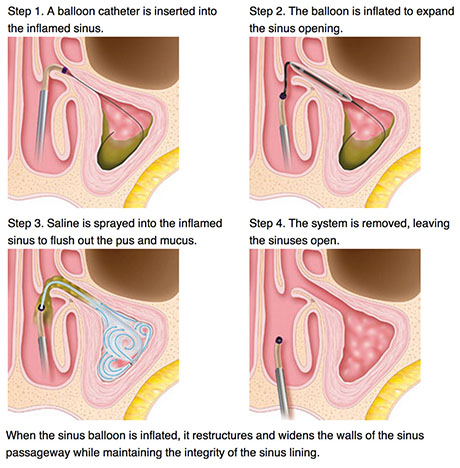Sinuses and Sinusitis
Sinuses are air-filled spaces in the bones of the face and head. They are connected to the inside of the nose through small openings. The sinuses are important in the way we breathe through the nose and in the flow of mucus in the nose and throat.
When the sinuses are working properly we are not aware of them but they often are involved in infections and inflammations which cause symptoms. These infections and inflammations are called sinusitis. Sinusitis is caused by blocked, inflamed or infected sinuses. Patients will often complain of a blocked nose, pressure or congestion in the face, runny nose or mucus problems. Other symptoms include headache and lose of sense of smell. Sinusitis can be difficult to diagnose and your specialist will want to examine your nose with a telescope in order to help find out what is wrong.
Most patients with sinusitis get better without treatment or respond to treatment with antibiotics or nose drops, sprays or tablets. In a very small number of patients with severe sinusitis an operation may be needed. In rare cases if sinusitis is left untreated it can lead to complications with infection spreading into the nearby eye socket or into the fluid around the brain. These very rare complications are just some of the reasons that a sinus operation may become necessary.


What is endoscopic sinus surgery or FESS?
Endoscopic Sinus Surgery is the name given to operations used for severe or difficult to treat sinus problems. In the past sinus operations were done through incision (cuts) in the face and mouth but endoscopic sinus surgery allows the operation to be performed without the need for these cuts.
Before any operation patients will be treated using drops, tablets or sprays for a period of weeks if not months. Only if these treatments are unsuccessful will an operation become necessary. After an examination of your nose with a telescope your surgeon will discuss whether or not you will need to have a CT scan to help decide about the need for an operation.
What if I don't have the operation?
Endoscopic sinus surgery is only one approach to the treatment of sinusitis. Endoscopic sinus surgery is as safe, and possibly safer, than other methods of operating on the sinuses.
The other methods of operating on the sinuses involve cuts in the face or mouth and if you feel that this maybe more appropriate in your case you should discuss this with your surgeon. In some patients an operation can be avoided by use of antibiotics and steroid medicines, again this should be discussed with your surgeon.
You may change your mind about the operation at any time, and signing a consent form does not mean that you have to have the operation. If you would like to have a second opinion about the treatment, you can ask your specialist. He or she will not mind arranging this for you. You may wish to ask your own GP to arrange a second opinion with another specialist.
The operation
Usually the operation is done with the you asleep (General Anaesthetic) but it can also be done with just your nose anaesthetised (Local Anaesthetic). The operation is all done inside your nose. Rarely there maybe some bruising around the eye but this is very uncommon. There should be no need for incisions (cuts) unless the operation is a complicated one in which case this will have been discussed with you before the operation.
How long will I be off work?
You can expect to go home on the day of your surgery or the day after your operation depending on the size of your operation. You will need to rest at home for at least a week. If you do heavy lifting and carrying at work you should be off work for at least two weeks. You will be given instructions on when to return to the hospital for your follow-up visit.
Possible complications
All operations carry some element of risk in the form of possible side effects. There are some risks that you must know about before giving consent to this treatment. These potential complications are very uncommon. You should discuss with your surgeon about the likelihood of problems in your case before you decide to go ahead with the operation.
- · Bleeding is a risk of any operation. It is very common for small amounts of bleeding to come from the nose in the days following the operation. Major bleeding is extremely uncommon and it is very rare for a transfusion to be required.
- · Eye problems: The sinuses are very close to the wall of the eye socket. Sometimes minor bleeding can occur into the eye socket and this is usually noticed as some bruising around the eye. This is usually minor and gets better without any special treatment, although it is important that you do not blow your nose. More serious bleeding into the eye socket sometimes can occur, however this is very rare. This can cause severe swelling of the eye and can even cause double vision or in very rare cases loss of sight. If such a serious eye complication did occur you would be seen by an eye specialist and may require further operations.
- · Spinal Fluid Leak: The sinuses are very close to the bone at the base of the brain. All sinus operations carry a small risk of damage to this thin bone with leakage of fluid from around the brain into the nose, or other related injuries. If this rare complication does happen you will have to stay in hospital longer and may require another operation to stop the leak. On very rare occasions infection has spread from the sinuses into the spinal fluid causing meningitis but this is extremely uncommon. You can discuss this complication with your surgeon before the operation.
How often do complications happen?
In general, major complications are very rare. In a survey of all ENT surgeons who do this type of operation in England and Wales, eye complications happened in one in every five hundred operations, but there was no associated loss of vision. Spinal fluid leaks happened in one case in every thousand operations, but were detected and repaired at the same operation, so the risks are small. Minor complications, including bleeding from the nose occurred more often. One in four patients reported mild persistent bleeding after the operation, which resulted in readmission to hospital in some cases. If you are particularly worried you should ask your surgeon about his or her experience of these complications.
Disclaimer
The details in this section are for general information only. Always check with your own doctor.